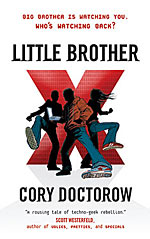
![]() verkisto
verkisto
7/26/2016
![]()
I have a philosophy about fiction that I've stated more than once here on my blog, but I feel like it bears repeating: Fiction tells us the truth by lying to us. Mostly when I say that, I mean that a novel shows us a universal truth about humanity by couching it in a dramatic way, but with Little Brother, I find that I mean this story tells us all the big truths about security versus freedom in the digital, post-terrorism world since 9/11. In fact, this novel could easily have been a nonfiction book, for all of the information the author weaved in among the story. This could be considered bad or good, depending on how the author managed to put it together. So how did he do?
Well, the book is good. Very good. Brilliant, even. And what makes the book brilliant is that none of the info-dumps in the book feel out of place. The characters and events are wrapped up in a plot that revolves around the very things that are discussed in the book, and if the narrator breaks from the story to give us an explanation of what it is he's talking about with his Xnet and defining what a false positive is, it never feels forced. While I'm sure that a handful of the readers of this novel might already know some of the details that Doctorow covers, the majority, I think, are going to be exposed to some new ideas and concepts, so the explanations are necessary, and don't feel intrusive to the story.
More to the point, the story that carries all this truth works very, very well. Marcus, the main character, is the perfect embodiment of a sympathetic character, as he's a person who is viewed as a terrorist simply because he doesn't agree with the methods the DHS is using to identify terrorist activity. Because he fights back against a system that believes that anyone who doesn't give up their privacy must have something to hide, he's constantly in a state of being beaten down, both literally and figuratively. It creates the right kind of drama to allow the reader to relate to him, and as the first quarter of the novel comes to a close, it's impossible not to be on his side.
Can Little Brother be considered propaganda? Absolutely. Should it be considered required reading? Almost certainly. Because its target audience is young adults, I almost feel like this was Doctorow's goal, to get every high schooler to read this novel and react to it. The rest of us will just have to discover it through different channels.